
Dive into the world of George Orwell with this comprehensive guide to all 10 of his books. From classic science fiction novels like Animal Farm and 1984 to lesser-known titles such as Homage to Catalonia and A Clergyman’s Daughter.
Explore the themes, characters, and settings of each story and discover why Orwell is one of the most influential authors of the 20th century.
No products found.
George Orwell (pen name), born Eric Arthur Blair in 1903, was an English novelist, essayist, journalist, and critic. He is widely considered one of the most influential writers of the 20th century, and his works continue to be widely read and studied today.
Orwell is perhaps best known for his dystopian novel, “1984,” which depicts a totalitarian society in which the government controls every aspect of citizens’ lives, including their thoughts and beliefs. The book has had a profound impact on popular culture and political discourse, with concepts such as “Big Brother,” “thoughtcrime,” and “doublethink” entering the lexicon.
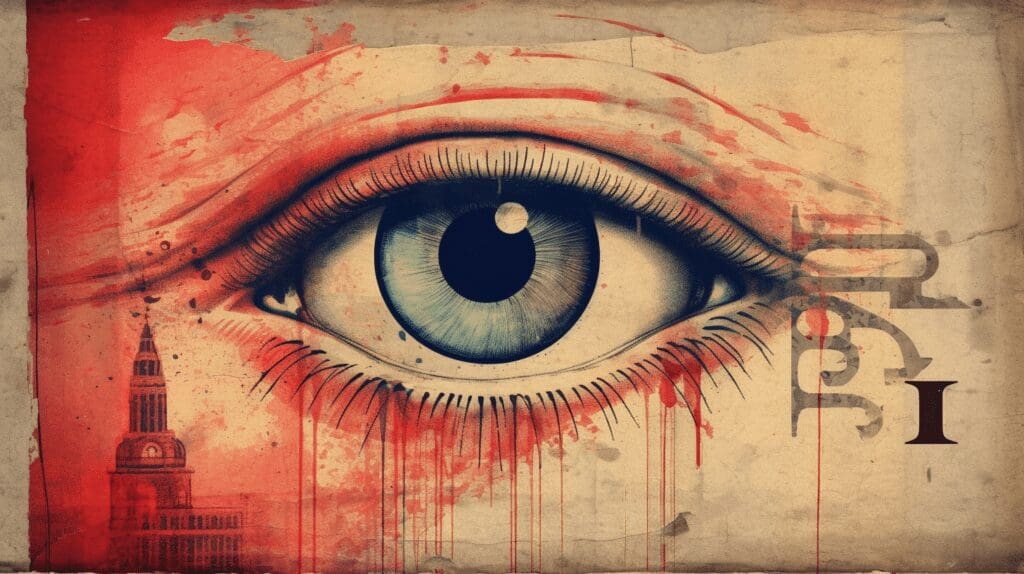
However, Orwell’s writing extended beyond “1984.” He also wrote several other novels, including “Animal Farm,” a satirical allegory of the Russian Revolution and the rise of Stalinism, as well as numerous essays and articles on politics, literature, and culture. Throughout his career, Orwell was known for his clear and concise prose, commitment to social justice, and willingness to speak truth to power.
Although Orwell died in 1950 at age 46, his legacy lives on, and his work continues to be celebrated for its insight, relevance, and enduring power.
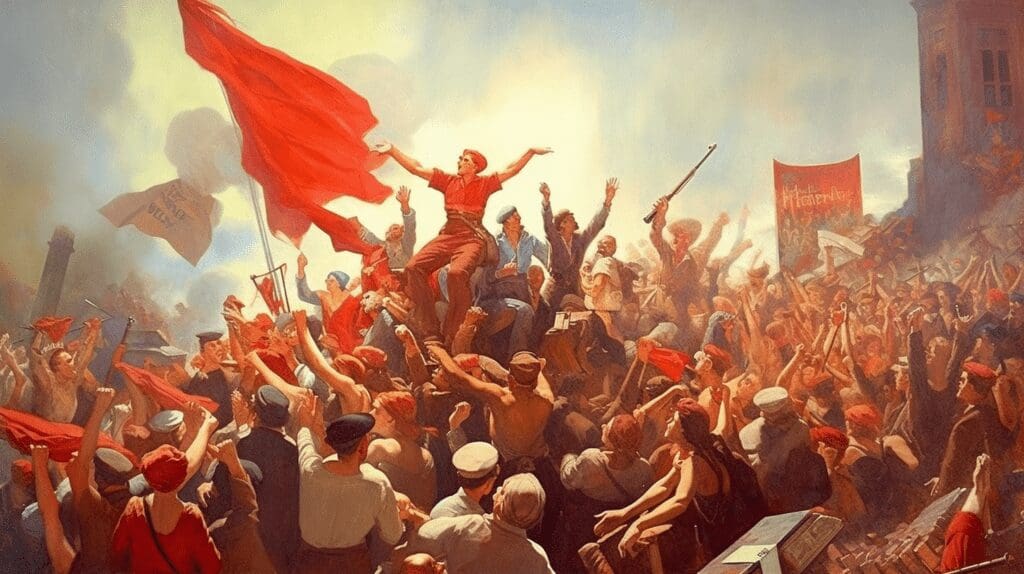
Democratic socialism is a political ideology that advocates for a socialist economy in which workers own and control the means of production, alongside a democratic political system that empowers citizens to participate in decision-making processes.
Unlike traditional socialism, democratic socialism does not advocate for a one-party state or a centrally planned economy but instead emphasizes the importance of individual liberties and freedoms, as well as a decentralized system of governance.
Proponents, like Orwell, of democratic socialism argue that it offers a more equitable distribution of wealth, promotes social justice and equality, and ensures that basic needs, such as healthcare and education, are accessible to all members of society.
The term “democratic socialism” is often used interchangeably with “social democracy,” which emphasizes a similar mix of socialist and democratic values but typically accepts the existence of a market economy.
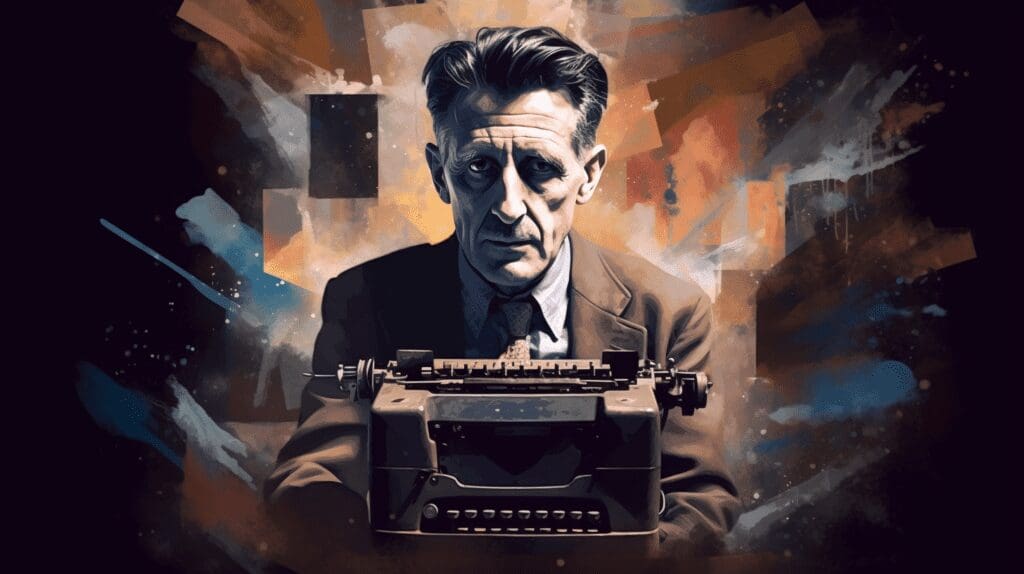
George Orwell’s writing style is known for its clarity, precision, and directness. He believed in the power of plain language to convey complex ideas and emotions, and his writing is characterized by simplicity and accessibility that makes it accessible to a wide range of readers.
Orwell’s writing style is also notable for its political and social commentary, and many of his works use satire, allegory, and other literary devices to critique totalitarianism, imperialism, and other forms of oppression.
Despite the seriousness of his subject matter, however, Orwell’s writing style is often marked by dry wit and humor that adds an extra layer of engagement to his work. Overall, Orwell’s writing style remains one of the most influential and widely recognized of the 20th century, and his commitment to clear and accessible prose inspires writers today.
In this vivid and gritty memoir, George Orwell recounts his impoverished experiences in two of Europe’s most famous cities.
From working as a dishwasher in Paris to living in homeless shelters in London, Orwell paints a striking picture of the destitution, hunger, and squalor he and his fellow down-and-outers endure.
Along the way, he encounters a cast of colorful characters, including pimps, prostitutes, and thieves, all struggling to survive in a harsh and unforgiving world.
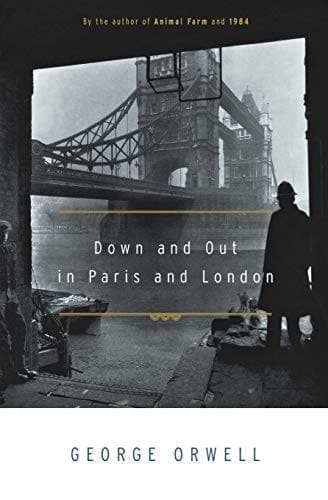
Despite the bleakness of his circumstances, Orwell’s prose is both compelling and compassionate, making “Down and Out in Paris and London” a powerful and unforgettable account of life on the margins.
“Burmese Days” is a thought-provoking novel set in the waning days of the British Empire in Burma. The story centers around John Flory, a jaded timber merchant disillusioned with the corrupt and oppressive colonial system.
When Flory meets a beautiful Burmese woman named Ma Hla May, he is forced to confront the deep-seated racism and prejudice that permeates every aspect of colonial life.
As tensions rise between the British colonizers and the native Burmese, Flory must choose between his self-interest and moral convictions.
With its incisive social commentary and vivid portrayal of life in colonial Burma, “Burmese Days” remains a powerful and timeless literature.
Burmese Days was Orwell’s first novel. Together with Animal Farm and 1984, it is one of the most famous novels. The book contains unpleasant facts about colonial rule by the British Empire.
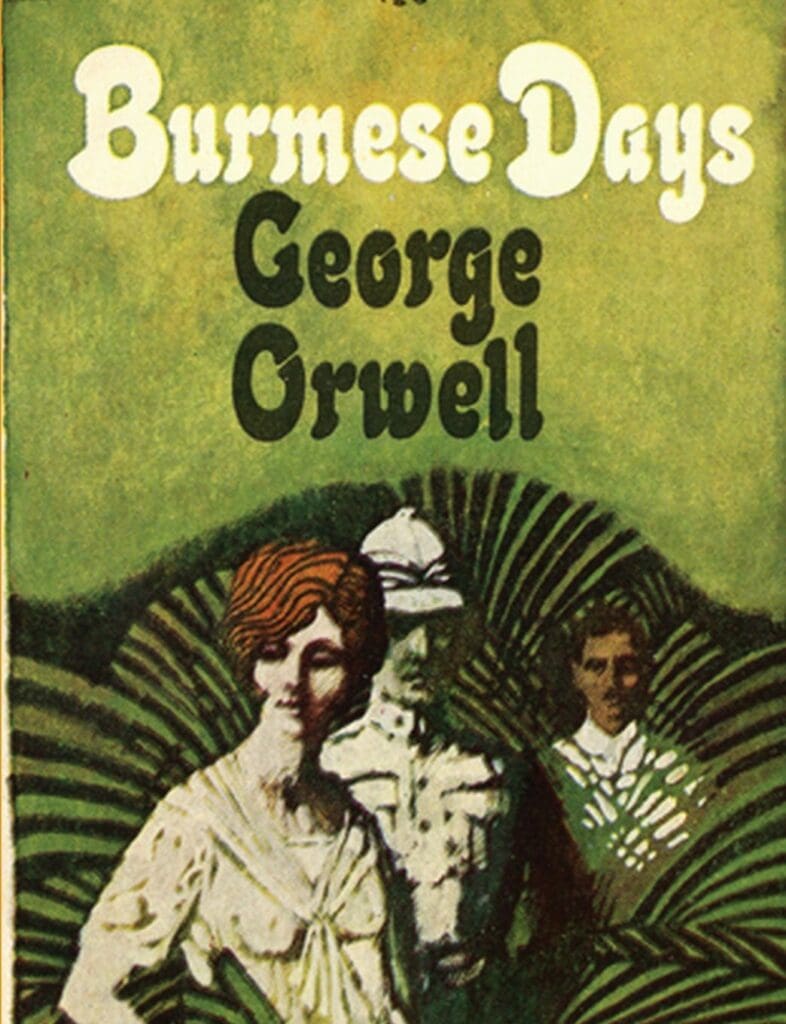
The Indian Imperial Police (IIP) was the primary law enforcement agency in British India from 1857 to 1947. The force was responsible for maintaining law and order in the British Indian Empire, encompassing present-day India, Pakistan, Bangladesh, and Burma (now Myanmar) during its British Imperialism.
The IIP was predominantly composed of British officers, with Indian officers serving in subordinate roles. The force had a reputation for being harsh and repressive, particularly towards Indian nationalists who were agitating for independence. George Orwell served in the IIP in Burma (now Myanmar) from 1922 to 1927.
The experience profoundly affected him and influenced much of his later writing. Orwell’s time in the police force also gave him a firsthand view of the injustices of British imperialism, which he would later critique in his essays and other works.
Despite his initial enthusiasm for the job, Orwell eventually became disillusioned with the police force and resigned, setting him on the path to becoming a full-time writer and outspoken critic of imperialism and totalitarianism.
This novel follows the life of Dorothy Hare, a rector’s daughter who lives a quiet and monotonous life in the small town of Knype Hill.
After a bizarre and unexplained episode, Dorothy wakes up one day without a memory of who she is or how she got there.
In the novel, she embarks on a journey of self-discovery and liberation, rebelling against the strictures of her social class and the stifling expectations placed upon her by her father and the church.

With its nuanced portrayal of one woman’s struggle for independence and freedom, “A Clergyman’s Daughter” is an insightful exploration of the human condition. One I surely recommend you read.
It is a satirical novel that skewers the world of advertising and consumerism. The story follows the trials and tribulations of Gordon Comstock, a struggling poet who works in a bookstore and dreams of becoming a writer.
Despite his ideals and aspirations, Gordon is trapped in a cycle of poverty and despair, constantly weighed down by the pressures of bills and obligations.
When an opportunity arises to work for an advertising agency, Gordon is forced to confront the compromises and trade-offs that come with financial stability.
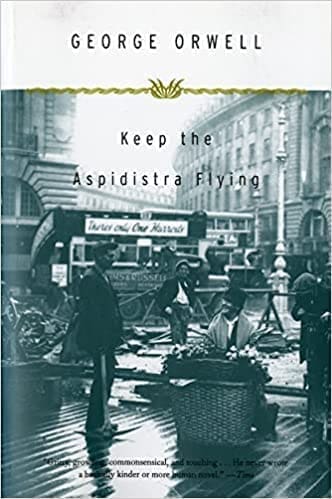
With its biting wit and incisive critique of capitalism, “Keep the Aspidistra Flying” is a timely and thought-provoking novel that still resonates today.
“The Road to Wigan Pier” is a powerful and evocative work of reportage that documents the lives of working-class communities in northern England during the Great Depression.
Part travelogue and part social commentary, the book takes you on a journey through the coal-mining towns and industrial heartlands of Lancashire and Yorkshire. The story takes place just before World War II when poverty, disease, and unemployment are rife in the regions around Wigan Pier. This was Orwell’s England.
Along the way, Orwell reflects on the failings of capitalism, the inadequacies of socialism, and the urgent need for social and economic reform.
Orwell’s experiences during this time greatly influenced his political views and opposition to fascism and totalitarianism, which he later explored in his writing, including his famous novel “1984.”
Interestingly, during World War II, the government used “The Road to Wigan Pier” to persuade Americans to support the war effort by highlighting the need to fight against poverty and injustice worldwide.
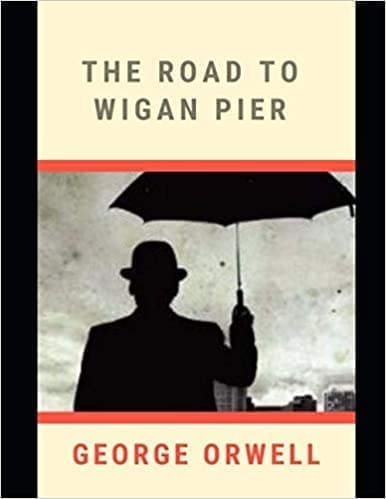
No products found.
With its vivid descriptions, insightful analysis, and heartfelt empathy for the downtrodden and dispossessed, “The Road to Wigan Pier” remains a landmark work of non-fiction.
The Spanish Civil War was a significant conflict in Spain from 1936 to 1939, characterized by a complex and multifaceted political and social struggle between different factions and ideologies. The war significantly impacted Spain’s history and society, and it continues to be studied and debated by scholars and historians to this day. This book by George Orwell, full of his war commentaries, is a memoir of his experiences fighting in the Spanish Civil War.
As a Workers’ Party of Marxist Unification (POUM) member, Orwell fought alongside other left-wing groups against General Francisco Franco’s fascist forces.
In this book, Orwell describes the brutal and confusing realities of war, including his near-fatal injury and the political betrayals and infighting that plagued the Republican side.
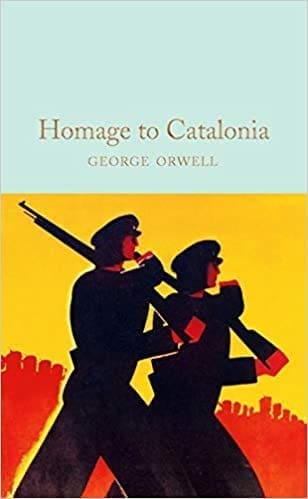
It is a gripping narrative and profound insights into the nature of war and politics. I believe “Homage to Catalonia” is a powerful testament to the courage and sacrifice of those who fight for a better world.
“Coming Up for Air” is a nostalgic and bittersweet novel that explores the tension between the past and the present.
The story follows George Bowling, a middle-aged insurance salesman who returns to his hometown in the English countryside to revisit the places and people of his youth.
As he retraces his steps and reflects on his memories, George is forced to confront how his life has changed and the deep-seated anxieties that haunt him.

With its rich and evocative descriptions of English life in the 1930s, “Coming Up for Air” is a poignant meditation on the passage of time and the search for meaning in an ever-changing world.
Animal Farm is one of Orwell’s most famous works. It is a classic allegorical novella that uses a farm and its animals as a metaphor for the events leading up to the Russian Revolution of 1917 and the subsequent rise of Stalinism in the Soviet Union.
The story begins with a group of farm animals, led by the pigs Napoleon and Snowball, who stage a rebellion against their human owner and establish a utopian society based on the principles of equality and cooperation.
However, the pigs become increasingly authoritarian and corrupt as time passes, transforming the farm into a totalitarian state that mirrors the system they once rebelled against.
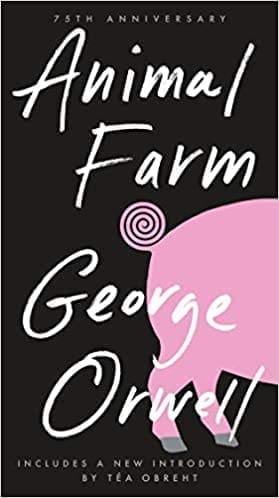
A powerful narrative and incisive commentary on the perils of political power and propaganda. “Animal Farm” remains a timeless and essential work of literature.
Nineteen Eighty-Four is a dystopian novel set in a totalitarian society ruled by a government known as “The Party.” The government uses technology to monitor the civilians constantly; Big Brother is watching you! Undoubtedly, it is one of the most popular George Orwell books.
The story follows Winston Smith, a low-ranking Party member who begins questioning the Party’s teachings and policies.
As Winston becomes increasingly disillusioned, he starts to rebel against the Party’s surveillance and control, embarking on a dangerous journey of self-discovery and resistance.

Set in a world of perpetual war, propaganda, and thought control, “Nineteen Eighty-Four” is a chilling and prophetic warning against the dangers of totalitarianism and the erosion of individual freedom.
Shooting an Elephant and Other Essays is a collection of essays by George Orwell that explore a wide range of themes, including politics, society, and literature. These are the so-called narrative essays and stories witnessed firsthand by the narrator. This makes them slightly different from the other George Orwell books.
Another notable narrative essay by Orwell is “A Hanging,” which describes the execution of a prisoner in colonial Burma. The essay explores the moral implications of capital punishment and the dehumanizing effects of participating in taking a life.
The title essay, “Shooting an Elephant,” recounts Orwell’s experience as a colonial police officer in Burma and his conflicted feelings about shooting an elephant to satisfy the demands of the local population.
Other essays in the collection include “Politics and the English Language,” in which Orwell critiques the misuse of language in politics, and “Why I Write,” in which he reflects on his own motivations and struggles as a writer.
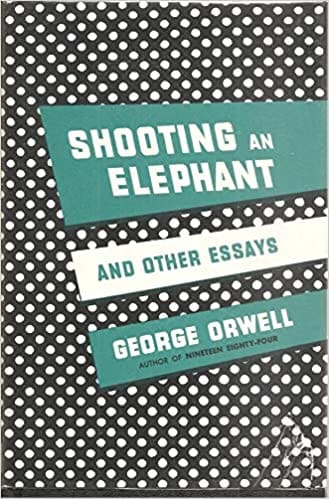
It has sharp and incisive commentary on the human condition. “Shooting an Elephant and Other Essays” is a must-read for anyone interested in the art of the essay and the complexities of human experience. These collected essays are well known worldwide and provide eyewitness experiences of both human suffering and humans as the cause of suffering.
George Orwell was a highly influential and prophetic writer whose works continue to resonate with readers worldwide.
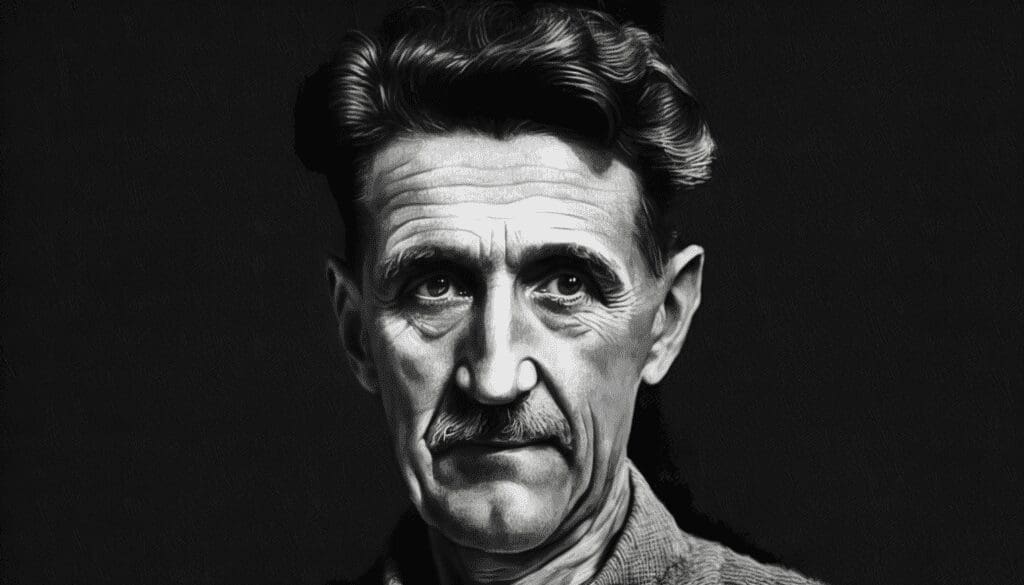
His novels and essays are marked by their incisive social commentary, exploration of complex political and social themes, and haunting and enduring visions of the future.
Whether it is the nightmarish world of “Nineteen Eighty-Four,” the allegorical tale of “Animal Farm,” or the scathing critique of imperialism in “Burmese Days,” Orwell’s works offer powerful and thought-provoking insights into the human experience.
With their timeless relevance and powerful indictment of the dangers of totalitarianism, censorship, and propaganda, George Orwell’s books remain essential for anyone interested in literature, politics, and the complexities of the human condition.
Along with his literary achievements, George Orwell is also known for his many insightful and memorable quotes, which have become part of the cultural lexicon. One of his most famous quotes is, “In a time of deceit, telling the truth is a revolutionary act.”
This quote is particularly relevant today, where truth and honesty are often overlooked in favor of expediency and convenience. Orwell’s words remind us that speaking the truth can be a powerful act of rebellion against the status quo and can profoundly impact society.
Another famous George Orwell quote is “All animals are equal, but some animals are more equal than others.” This quote is from his novel “Animal Farm,” a satirical commentary on the Soviet Union and the dangers of totalitarianism. The quote highlights the hypocrisy of those in power who claim to promote equality while practicing discrimination and favoritism.
George Orwell, born Eric Arthur Blair, passed away on January 21, 1950, marking the end of an era in literature. His death, at the age of 46, was due to a battle with tuberculosis, a disease that had plagued him for several years. Orwell’s health had been in decline, exacerbated by the harsh conditions he endured during his time in the Spanish Civil War and the frigid winters on the Scottish island of Jura, where he wrote his final novel, “1984”.
Orwell’s passing occurred in a London hospital, far from the totalitarian world he depicted in his works, yet his insights into the dangers of authoritarianism continue to resonate. The legacy he left through his novels, essays, and journalistic works has cemented his status as one of the most influential writers of the 20th century.
For a detailed account of Orwell’s life, including his final years and the circumstances surrounding his death, the BBC offers an insightful article, which can be found here. Additionally, The Orwell Foundation provides comprehensive resources on his life and works, including discussions on his health and demise, accessible here.
Orwell’s death was not just the loss of a great writer but also the silencing of a profound and critical voice in the landscape of political and social commentary. His works, particularly “Animal Farm” and “1984,” have outlived him, continuing to challenge and inspire readers around the world.